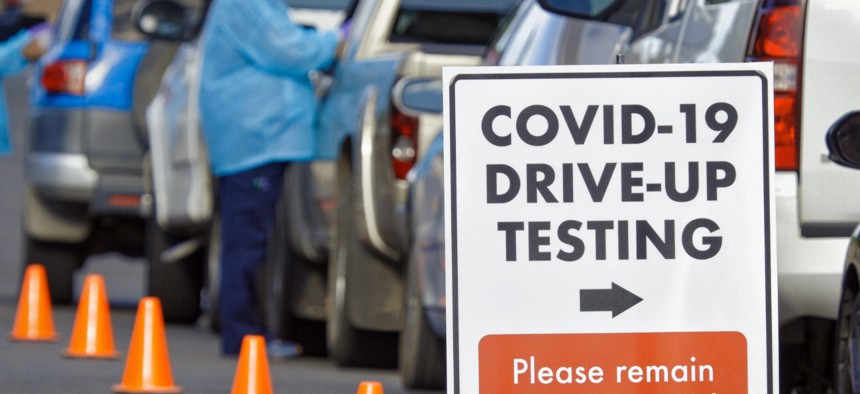Agencies Struggle to Implement Mass Testing for Unvaccinated Feds

hoptocopter / istock
The Biden administration is requiring at least weekly COVID-19 testing for the unvaccinated, but the White House has offered few details about how that will happen.
The Biden administration is enforcing “strict” new rules to mandate weekly testing of federal employees not vaccinated against COVID-19, but agencies do not yet have a plan to implement the burdensome requirements they now face.
President Biden last week announced federal workers would soon be required to either “attest” they have been vaccinated or wear a mask and practice social distancing in the office and be subject to at least weekly testing for the coronavirus. The Safer Federal Workforce Task Force—led by the White House, General Services Administration and the Office of Personnel Management—issued guidance calling on every federal agency to “establish a program” to test employees either once or twice per week. The guidance left many questions unanswered, such as where the tests would be available, who would administer them and how they would be processed.
An Office of Management and Budget official told Government Executive the task force would provide further guidance to agencies on testing programs, but could not give a timetable for when it would issue that information or when the programs would be stood up.
White House spokeswoman Karine Jean-Pierre said agencies would be implementing the testing programs themselves and pay for the costs out of their own funding.
“They'll be in charge of that, how that moves forward,” Jean-Pierre said. “So that's kind of how that's going to be dispersed, the program.”
White House Press Secretary Jen Psaki later added that the budgeting for the testing may vary from agency to agency, but it “probably would be part of their funding.”
Some agencies will have a fairly easy time setting up a testing program. The Veterans Affairs Department, for example, already has robust testing in place at its facilities. For most agencies, however, especially those with offices throughout the country, the endeavor is likely to create significant logistical hurdles. Bill Hall, a spokesman for the Health and Human Services Department, said “all that’s currently being worked out” and no details were yet available. A spokesman for the Interior Department said no details were available yet on its testing program, while the Small Business Administration and Homeland Security Department declined to comment. The Education Department referred a reporter back to OMB.
The Safer Federal Work Force Task Force, which Biden launched by executive order shortly after taking office, offered a peak at how the testing might play out for agencies. It said in a post to its “frequently asked questions” page that "in lieu of conducting testing onsite," agencies can require its unvaccinated employees and onsite contractors to "provide proof of a timely negative COVID-19 test." Employees can avoid the testing requirement by signing a document affirming they have been vaccinated. The administration has not yet announced when those forms would be distributed or when they must be signed.
To date, just the departments of Veterans Affairs and Defense have announced vaccine mandates, for health care providers and members of the military, respectively. Some VA employees have met the announcement with apprehension, with some workers saying they will quit or retire rather than get vaccinated. The department has been much clearer than the rest of government in spelling out how it will implement its requirements, though it has yet to say explicitly what will happen to staff who refuse to be vaccinated.
White House Coronavirus Response Coordinate Jeff Zients said the administration had set up “quite strict rules” on testing for the unvaccinated, though he did not offer details. He added that more agencies could soon be subjected to a similar vaccine mandate.
“We will continue to look across the federal government at other areas where requiring vaccines, everyone being vaccinated may make sense, particularly in the healthcare setting,” Zients said.
NEXT STORY: Quick Hits






